Start Your Free Trial!
Sign up to our newsletter, stay updated on news and exclusive offers from EaseUS. Don't worry, if you change your mind, you can unsubscribe at any time, free of charge. We value your privacy (Privacy Policy).
Page Table of Contents
What Is Required to Install Windows 10 from USBHOT
Run EaseUS Partition MasterHOT
Use Windows Media Creation ToolHOT
Bonus Tip for Installing Windows 10 from Bootable USBHOT
Apply USB Troubleshooting HOT
ConclusionHOT
Install Windows 10 from USB FAQsHOT
About the Author
Hot Topics
Updated on Mar 28, 2025
Installing Windows 10 on your new computer or drive has several ways. Using a bootable USB to install Windows 10 and set up the operating system is an excellent way to do this when you don't have a CD or DVD drive. This guide will describe two ways to create a USB drive from a Windows installation ISO file and install Windows 10 from USB. Continue reading for detailed step-by-step instructions.
View the Necessary Information to Install Windows 10 from USB:
| ⏱️Duration | About half an hour |
| 💻Supported system | Windows 11 |
| ⛑️Preparation | USB, ISO file, Bootable USB tool |
| 🧑💻Difficulty |
✔️[Easy] Install Windows 10 from USB via EaseUS Partition Master ✔️[Complex] Use Windows Media Creation Tool to Install Windows 10 from USB |
| 👣Steps |
Step 1. Set the Active Partition After Formatting the Drive |
Before we start the formal steps of installing Windows 10 from USB, let's check the preparations needed to install the operating system:
Then let's start installing Windows 10 from USB by following these steps. Read the article below if you don't know where to install Windows.
For other solutions to install Windows without product key, please check the following article:
How to Install Windows 10 Without Product Key
You can install Windows 10 without product key by downloading the Windows 10 ISO from Microsoft. This page will offer a comprehensive solution on how to do it.
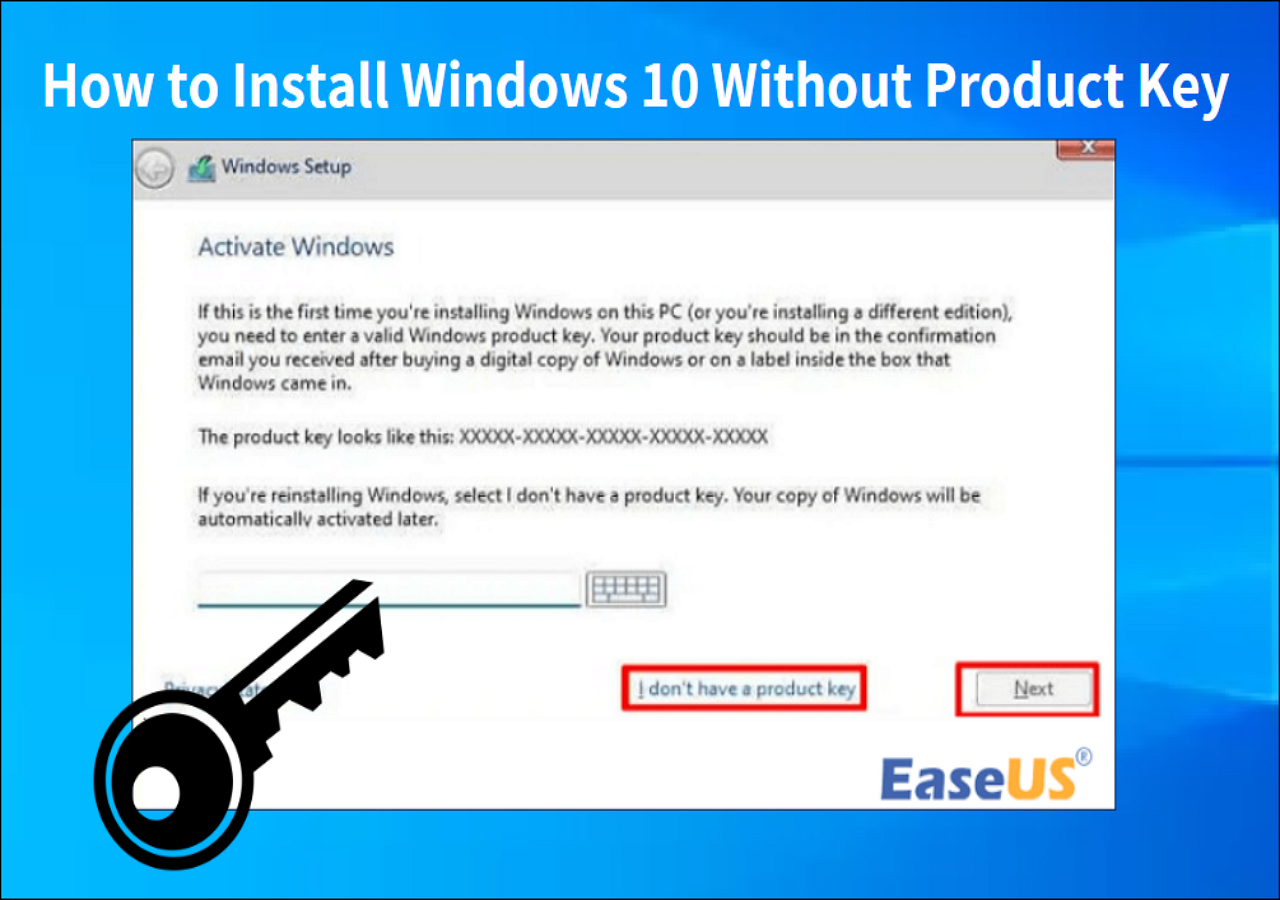
Before you start, download the professional Windows bootable tool: EaseUS Partition Master, which provides a full solution for installing Windows 10, including formatting drives, ISO burning, and bootable USB creation. It is the ultimate safe and secure partition manager. Using this tool can help you save a lot of time and effort.
Then refer to the following steps:
USB needs to be set to FAT32 format to burn ISO. You can format the USB using Disk Management or CMD or use the USB formatting tool:
Step 1. Launch EaseUS Partition Master, right-click the partition you intend to format and choose "Format".
Step 2. In the new window, enter the Partition label if you prefer to rename it, choose the FAT32/EXT2/EXT3/EXT4 file system, and set the cluster size according to your needs, then click "OK".
Step 3. Then you will see a warning window, click "Yes" in it to continue.
Step 4. Click the "Execute 1 Task(s)" button in the top-left corner to review the changes, then click "Apply" to start formatting the partition to FAT32/EXT2/EXT3/EXT4.
And you can also refer to the following steps to try the manual method:
If the partition is marked as active and not available, please use diskpart to repair it.
Further Reading:
How to Install Windows on Steam Deck in 2024? Complete Guide
In the post, you will learn how to install Windows OS on Steam Deck in detail, along with a step-by-step tutorial and some troubleshooting alternatives.
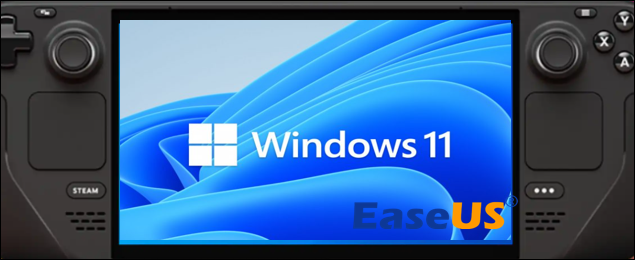
We need to burn the Windows ISO file to the corresponding USB drive to install Windows on the new computer. Burning ISO is different from simple copy and paste; we need a free ISO burner- EaseUS Partition Master. It is easy to use. Follow the steps to burn ISO to USB:
Step 1. Launch EaseUS Partition Master and go to the Bootable Media section. Click "Burn ISO" and click "Next".
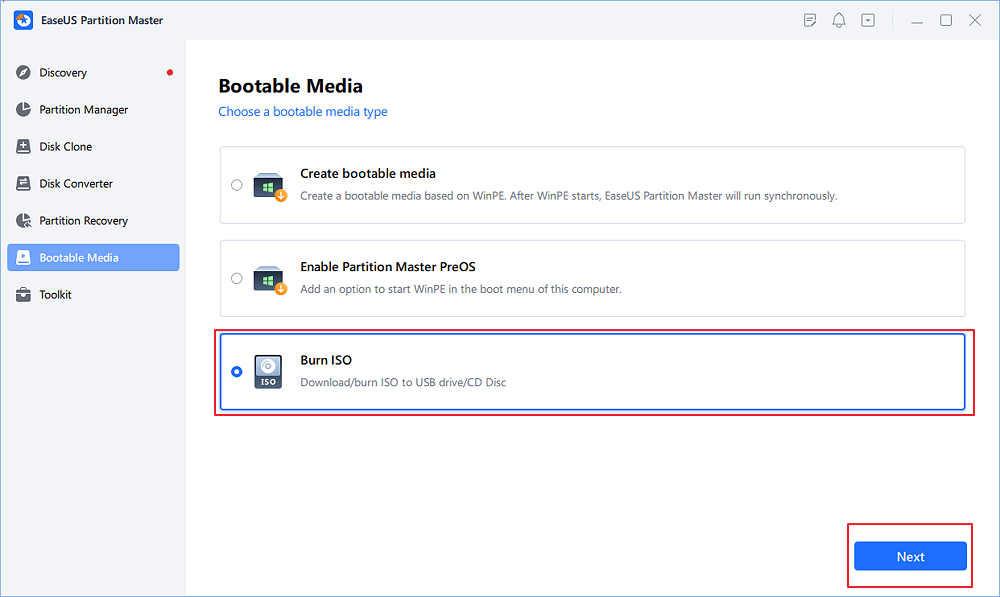
Step 2. Select the ISO image that you have downloaded on your PC, and click "Open".
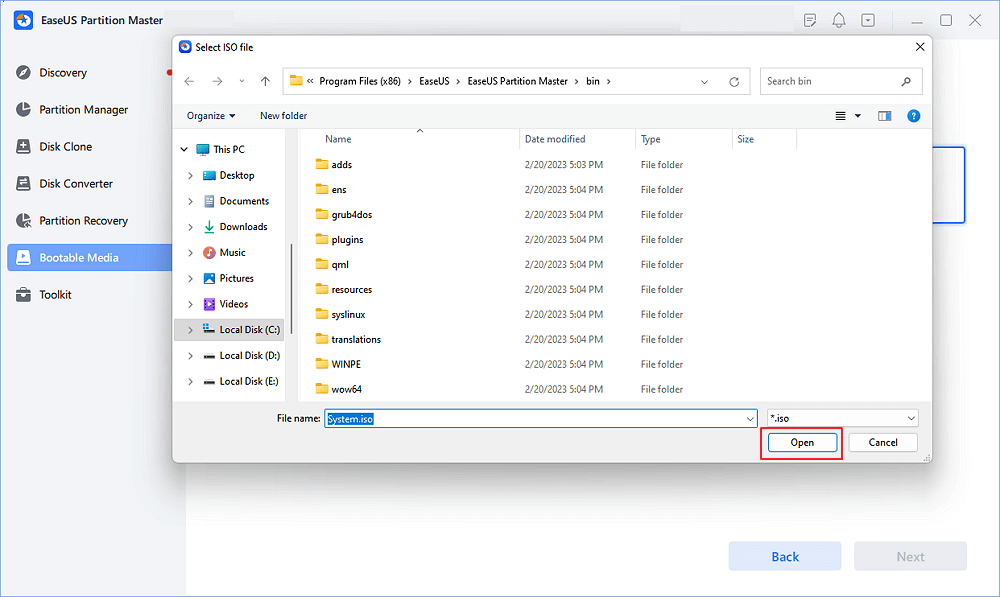
Step 3. Click "Next" and select the target USB as destination and click "Burn" to execute the operation.
Once the burning is done, you can use the USB as an installation disk to install Windows 10 on new PC without OS. Burning ISO is a very simple process, and EaseUS Partition Master will help you to manage your calculator and drive better. Click the button below. You can send the tool to your friends if you enjoy it.
Then you can install Windows 10 on another computer using the burned USB. Before you start, ensure that the computer needs to meet the hardware requirements for Windows 10. The following are the minimum system specifications:
Then follow these steps to install Windows 10 from USB:
After finishing these instructions, you are now prepared to install Windows 10 on your computer.
You May Also Like:
If you want to use Windows Media Creation Tool to install Windows 10, please follow the first part to prepare. Then download Windows 10 tool and continue reading the guide in this section:
Note: The following steps are for creating a bootable USB using the media creation tool released by Microsoft. You can fully rely on that method.
Step 1. Run Windows installation media as administrator and select "Create installation media for another PC."
Step 2. Select the Windows version and architecture (64-bit or 32-bit).
Step 3. Select Media Tools. The Windows installation files will then be downloaded to your USB drive.
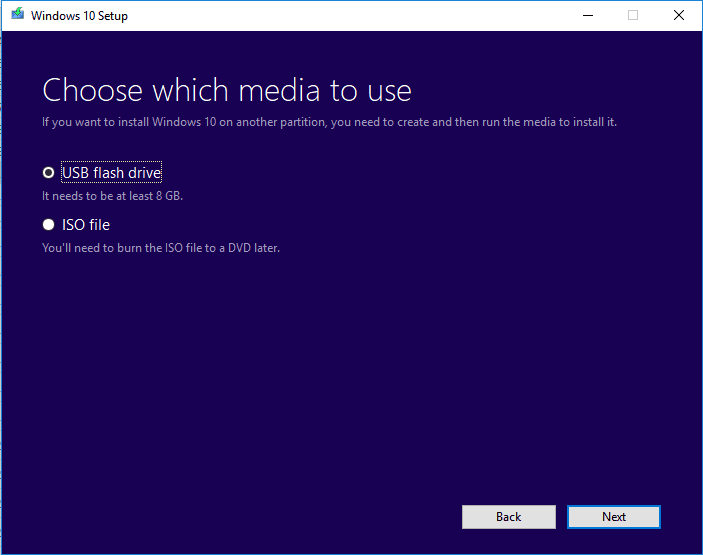
Read Also: Install Windows 10 on Second Hard Drive
After creating the bootable USB, burn the Windows 10 file to the USB:
Step 4. Find the location where you saved the ISO file.
Step 5. Select ISO file > Properties > General > Change > Windows Explorer.
Step 6. Right-click on the ISO file and burn it.
Then proceed to install Windows 10 using the Media Creation Tool:
Step 7. Connect the USB to the new computer.
Step 8. Open the Computer Boot Device and select USB Boot.

Step 9. Follow the on-screen instruction to complete the Windows 10 installation.
Step 10. Navigate to Settings > Update & Security > Windows Update to check for updates.

Another way you can try is to request remote assistance from EaseUS experts. Through this, EaseUS tech support team will help you finish installing the designed system from a bootable USB safely and efficiently.
EaseUS Windows Configuration Services
Click here to contact EaseUS Partition Master experts for free
EaseUS experts are available to provide you with 1-on-1 manual services (24*7) and help fix different Windows configuration issues. Our experts will offer you FREE evaluation services and efficiently diagnose and resolve Windows update errors, Windows installation, or daily OS issues using their decades of experience.
The Windows USB drive is formatted as FAT32, with a file size limit of 4 GB. When you are installing Windows 10 from USB, you may encounter the following two cases:
1. Unable to burn Windows ISO files
You cannot burn ISO files to USB on Windows for multiple reasons. If it is a USB limitation, please follow these steps to fix it:
robocopy D: E: /s /max:3800000000
Dism /Split-Image /ImageFile: D:\sources\install.wim /SWMFile: E:\sources\install.swm /FileSize:3800
2. Unable to download Windows 10 ISO file
You may encounter an error similar to Windows 11 KB5026446 that makes you to unable download Windows ISO files. VPN settings, insufficient disk space errors, a USB file system, and other factors may prevent the ISO file from downloading. You can troubleshoot the possible causes one by one.
Installing Windows 10 from USB is a complex task. If you meet any problems, you can contact the technical support team via live chat or email: support@easeus.com
How to Boot Windows 10 from USB Flash Drive
If you want to install Windows or run the same OS on different devices, follow this guide to create a bootable USB and boot Windows 10 from USB flash drive.
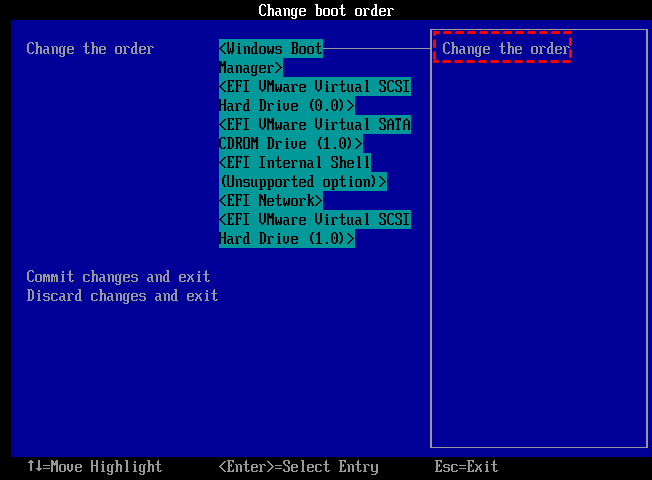
This article provides two ways to install Windows 10 from USB: using a bootable USB to install Windows 10 and the Windows 10 media creation tool. With EaseU Partition Master, you can easily create a bootable USB and burn the Windows ISO files to the USB so that they can be installed.
In addition, if you want to install Windows without USB, you can also use EaseUS Partition Master to migrate the operating system to HDD/SSD. If your computer fails to boot, EaseUS Partition Master offers many additional fixes, such as repairing MBR. Download it now! Try it out!
If you have other questions about installing Windows 10 from USB, please check the following answers to troubleshoot them one by one.
1. How to install Windows 11 on a new PC?
On a fresh PC, you can install Windows 11 in one of three ways:
Use the latter two approaches if you wish to install Windows 11 on a USB device. The simple steps to use the Windows Media Installation Tool are as follows:
2. Why does a blue screen happen when installing Windows from USB?
When installing Windows from USB, you may encounter a black screen or blue screen problem. It may be a hardware problem or a missing driver. You can fix it by integrating it into the USB. Or start an automatic repair in BISO.
3. What is the best Windows 10 bootable USB tool?
Windows 10 bootable USB tool should be able to burn Windows ISO to USB. If you want a bootable USB tool for Windows 10, try EaseUS Partition Master. It offers the ability to create a bootable USB and burn ISO. It saves more time compared to Windows media creation tools and can help you make portable Windows 10 on USB more efficiently.
How Can We Help You
Updated by Tracy King
Tracy became a member of the EaseUS content team in 2013. Being a technical writer for over 10 years, she is enthusiastic about sharing tips to assist readers in resolving complex issues in disk management, file transfer, PC & Mac performance optimization, etc., like an expert.
Cici is the junior editor of the writing team of EaseUS. She accepted the systematic training on computers at EaseUS for over one year. Now, she wrote a lot of professional articles to help people resolve the issues of hard drive corruption, computer boot errors, and disk partition problems.
It won't hot image your drives or align them, but since it's coupled with a partition manager, it allows you do perform many tasks at once, instead of just cloning drives. You can move partitions around, resize them, defragment, and more, along with the other tools you'd expect from a cloning tool.
Read MoreI love that the changes you make with EaseUS Partition Master Free aren't immediately applied to the disks. It makes it way easier to play out what will happen after you've made all the changes. I also think the overall look and feel of EaseUS Partition Master Free makes whatever you're doing with your computer's partitions easy.
Read MorePartition Master Free can Resize, Move, Merge, Migrate, and Copy disks or partitions; convert to local, change label, defragment, check and explore partition; and much more. A premium upgrade adds free tech support and the ability to resize dynamic volumes.
Read MoreIt won't hot image your drives or align them, but since it's coupled with a partition manager, it allows you do perform many tasks at once, instead of just cloning drives. You can move partitions around, resize them, defragment, and more, along with the other tools you'd expect from a cloning tool.
Read MoreI love that the changes you make with EaseUS Partition Master Free aren't immediately applied to the disks. It makes it way easier to play out what will happen after you've made all the changes. I also think the overall look and feel of EaseUS Partition Master Free makes whatever you're doing with your computer's partitions easy.
Read MoreRelated Articles
How to Play Xbox 360 Games From an External Hard Drive
![]() Sherly/2025/03/28
Sherly/2025/03/28
Format/Reformat Seagate External Hard Drive on Windows or Mac
![]() Tracy King/2025/01/23
Tracy King/2025/01/23
How to Resize EFI System Partition on Windows 11/10/8/7
![]() Daisy/2025/01/23
Daisy/2025/01/23
Access GPT Protective Partition Without Losing Data
![]() Jean/2025/03/28
Jean/2025/03/28
EaseUS Partition Master

Manage partitions and optimize disks efficiently
Your best companion for disk partitioning, MBR to GPT/GPT to MBR conversion,even OS migration
CHOOSE YOUR REGION
Start Your Free Trial!
Sign up to our newsletter, stay updated on news and exclusive offers from EaseUS. Don't worry, if you change your mind, you can unsubscribe at any time, free of charge. We value your privacy (Privacy Policy).
Start Your Free Trial!
Sign up to our newsletter, stay updated on news and exclusive offers from EaseUS. Don't worry, if you change your mind, you can unsubscribe at any time, free of charge. We value your privacy (Privacy Policy).